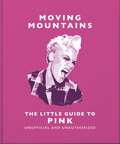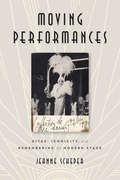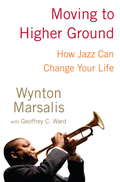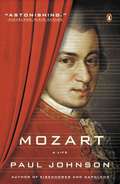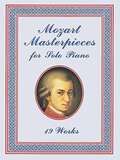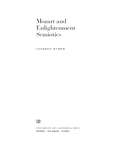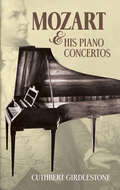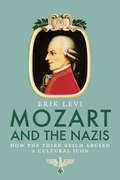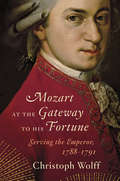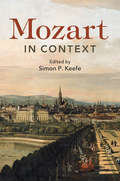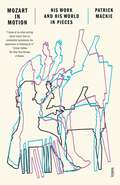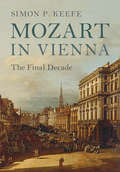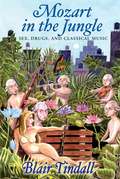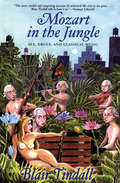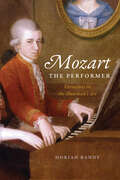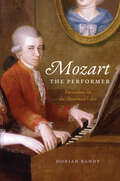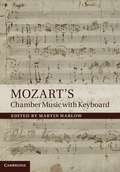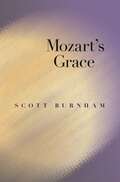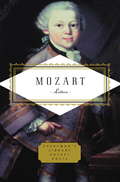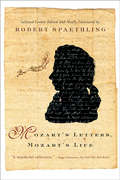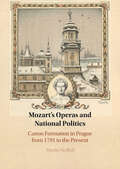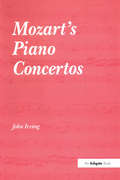- Table View
- List View
Moving Mountains: America's Miss Understood Since 2001 (The\little Book Of... Ser.)
by Orange Hippo!"I'm proof that things absolutely can happen." - PinkDubbed the next "Queen of Pop" for her distinctive voice and live acrobatic stage performances, Pink unapologetically smashed her way through the music industry at the mere age of 14. The incredible success of her masterpiece Missundaztood showcased the reality of Pink to the world; a strong, rebellious yet vulnerable woman who was here to conquer the music industry. With over 135 million albums and singles sold worldwide, nine studio albums and a long list of accolades, she is one of the world's best-selling music artists.Moving Mountains: The Little Guide to Pink is bursting with quotes taken from the mouth of the "toothless tiger" herself across interviews from all eras of her continuing career. From relatable quips to fascinating facts from her wild teenage days, this tiny tome will get you ready to paint the world pink.
Moving Mountains: America's Miss Understood Since 2001 (The\little Book Of... Ser.)
by Orange Hippo!"I'm proof that things absolutely can happen." - PinkDubbed the next "Queen of Pop" for her distinctive voice and live acrobatic stage performances, Pink unapologetically smashed her way through the music industry at the mere age of 14. The incredible success of her masterpiece Missundaztood showcased the reality of Pink to the world; a strong, rebellious yet vulnerable woman who was here to conquer the music industry. With over 135 million albums and singles sold worldwide, nine studio albums and a long list of accolades, she is one of the world's best-selling music artists.Moving Mountains: The Little Guide to Pink is bursting with quotes taken from the mouth of the "toothless tiger" herself across interviews from all eras of her continuing career. From relatable quips to fascinating facts from her wild teenage days, this tiny tome will get you ready to paint the world pink.
Moving Performances: Divas, Iconicity, and Remembering the Modern Stage
by Jeanne ScheperFabulous yet fierce, imperious yet impetuous, boss yet bitchy—divas are figures of paradox. Their place in culture is equally contradictory, as they are simultaneously venerated and marginalized, hailed as timeless but then frequently forgotten or exhumed as cult icons by future generations. Focusing on four early twentieth-century divas—Aida Overton Walker, Loïe Fuller, Libby Holman, and Josephine Baker—who were icons in their own time, Moving Performances considers what their past and current reception reveals about changing ideas of race and gender. Jeanne Scheper examines how iconicity can actually work to the diva’s detriment, reducing her to a fetish object, a grotesque, or a figure of nostalgia. Yet she also locates more productive modes of reception that reach to revive the diva’s moving performances, imbuing her with an affective afterlife. As it offers innovative theorizations of performance, reception, and affect, Moving Performances also introduces readers to four remarkable women who worked as both cultural producers and critics, deftly subverting the tropes of exoticism, orientalism, and primitivism commonly used to dismiss women of color. Rejecting iconic depictions of these divas as frozen in a past moment, Scheper vividly demonstrates how their performances continue to inspire ongoing movements.
Moving to Higher Ground
by Geoffrey C. Ward Wynton MarsalisIn this beautiful book, Pulitzer Prize—winning musician and composer Wynton Marsalis draws upon lessons he’s learned from a lifetime in jazz–lessons that can help us all move to higher ground. With wit and candor he demystifies the music that is the birthright of every American and demonstrates how a real understanding of the central idea of jazz–the unique balance between self-expression and sacrifice for the common good exemplified on the bandstand–can enrich every aspect of our lives, from the bedroom to the boardroom, from the schoolroom to City Hall. Along the way, Marsalis helps us understand the life-changing message of the blues, reveals secrets about playing–and listening–and passes on wisdom he has gleaned from working with three generations of great musicians. Illuminating and inspiring, Moving to Higher Ground is a master class on jazz and life, conducted by a brilliant American artist.
Mozart
by Paul JohnsonEminent historian Paul Johnson dazzles with a rich, succinct portrait of Mozart and his music As he's done in Napoleon, Churchill, Jesus, and Darwin, acclaimed historian and author Paul Johnson here offers a concise, illuminating biography of Mozart. Johnson's focus is on the music--Mozart's wondrous output of composition and his uncanny gift for instrumentation. Liszt once said that Mozart composed more bars than a trained copyist could write in a lifetime. Mozart's gift and skill with instruments was also remarkable as he mastered all of them except the harp. For example, no sooner had the clarinet been invented and introduced than Mozart began playing and composing for it. In addition to his many insights into Mozart's music, Johnson also challenges the many myths that have followed Mozart, including those about the composer's health, wealth, religion, and relationships. Always engaging, Johnson offers readers and music lovers a superb examination of Mozart and his glorious music, which is still performed every day in concert halls and opera houses around the world.
Mozart Masterpieces: 19 Works for Solo Piano (Dover Classical Piano Music)
by Wolfgang Amadeus MozartA superb assortment of the composer's best piano pieces includes sonatas, fantasies, variations, rondos, minuets, and more. Highlights include such engaging works as "Turkish Rondo," "Sonata in C," and a dozen variations on "Ah, vous dirai-je, Maman" (better known as "Twinkle, Twinkle, Little Star"). Reprinted from authoritative sources, the collection combines a magnificent selection of pieces in one convenient, attractive, inexpensive volume.
Mozart Studies 2
by Simon P. KeefeCultural, historical and reception-related contexts are central to understanding Mozart, one of the greatest and most famous musicians of all time. Widening and refining the lens through which the composer is viewed, the essays in Mozart Studies 2 focus on themes, issues, works and repertories perennially popular among Mozart scholars of all kinds, pointing to areas primed for future study and also suitable for investigation by musicians outside the scholarly community. Following on from the first Mozart Studies volume, internationally renowned contributors bring new perspectives to bear on many of Mozart's most popular works, as well as the composer's letters, biography, and reception. Chapters are grouped according to topics covered and collectively affirm the vitality of Mozart scholarship and the significant role it continues to play in defining and redefining musicological priorities in general.
Mozart Violin Sonatas (Complete Mozart Edition)
by Alec Hyatt King Jean-Victor Hocquard Uwe Jüttner Carlo VitaliThis is the text of the 82-page Compact Disc booklet which accompanies the Mozart Violin Sonatas volume of the Philips Complete Mozart Edition. It begins with a complete table of contents listing all the sonatas and tracks and is followed by essays in English, German, French and Italian discussing the works. The essay in English, German, and Italian is authored by Alec Hyatt King. The essay in French is by Jean-Victor Hocquard. The booklet is appropriately indexed for DAISY navigation. This lovely music is available on disc from many artists and is also available on Apple Music, YouTube, Spotify, and other digital music services. Whether you are a CD collector, a listener on a digital service or a performer, this booklet will help you gain a greater understanding and appreciation of this music.
Mozart and Enlightenment Semiotics
by Stephen RumphIn this groundbreaking, historically-informed semiotic study of late eighteenth-century music, Stephen Rumph focuses on Mozart to explore musical meaning within the context of Enlightenment sign and language theory. Illuminating his discussion with French, British, German, and Italian writings on signs and language, Rumph analyzes movements from Mozart's symphonies, concertos, operas, and church music. He argues that Mozartian semiosis is best understood within the empiricist tradition of Condillac, Vico, Herder, or Adam Smith, which emphasized the constitutive role of signs within human cognition. Recognizing that the rationalist model of neoclassical rhetoric has guided much recent work on Mozart and his contemporaries, Rumph demonstrates how the dialogic tension between opposing paradigms enabled the composer to negotiate contradictions within Enlightenment thought.
Mozart and His Piano Concertos (Dover Books On Music: Composers)
by Cuthbert Girdlestone Sara Davis BuechnerThis classic of music criticism provides detailed studies of 23 of Mozart's piano concertos. In addition to establishing the lines along which the genre developed, the concertos also shed light upon the technical and inspirational growth of their creator. The first full-length survey devoted to these works, this scholarly book presents a full, concrete musical analysis that makes liberal use of musical examples -- 417 in all -- and presents authoritative information on the concertos' form, tone, style, and balance as well as the circumstances of their composition. The author compares and contrasts each piece with Mozart's other works and with compositions by Beethoven, Haydn, and other composers. A definite text for musicologists, performers, teachers, and students, this study's clarity and personable tone make it accessible to any lover of Mozart's music.
Mozart and the Nazis: How the Third Reich Abused a Cultural Icon
by Erik LeviA music historian uncovers Nazi Germany&’s use of Mozart as a WWII propaganda tool in this &“intriguing study [that] comprehends a range of vital topics&” (Choice). As the Nazi war machine expanded its bloody ambitions across Europe, the Third Reich sought to promote a sophisticated and even humanitarian image of German culture through the tireless promotion of Mozart&’s music. In this revelatory book, Erik Levi draws on World War II era articles, diaries, speeches, and other archival materials to provide a new understanding of how the Nazis shamelessly manipulated Mozart for their own political advantage. Mozart and the Nazis also explores the continued Jewish veneration of the composer during this period while also highlighting some of the disturbing legacies that resulted from the Nazi appropriation of his work. Enhanced by rare contemporary illustrations, Mozart and the Nazis is a fascinating addition to the study of music history, World War II propaganda, and twentieth century politics.
Mozart at the Gateway to His Fortune: Serving the Emperor, 1788-1791
by Christoph WolffASCAP-Deems Taylor Award winner A fresh look at the life of Mozart during his imperial years by one of the world's leading Mozart scholars. "I now stand at the gateway to my fortune," Mozart wrote in a letter of 1790. He had entered into the service of Emperor Joseph II of Austria two years earlier as Imperial-Royal Chamber Composer--a salaried appointment with a distinguished title and few obligations. His extraordinary subsequent output, beginning with the three final great symphonies from the summer of 1788, invites a reassessment of this entire period of his life. Readers will gain a new appreciation and understanding of the composer's works from that time without the usual emphasis on his imminent death. The author discusses the major biographical and musical implications of the royal appointment and explores Mozart's "imperial style" on the basis of his major compositions--keyboard,chamber, orchestral, operatic, and sacred--and focuses on the large, unfamiliar works he left incomplete. This new perspective points to an energetic, fresh beginning for the composer and a promising creative and financial future.
Mozart in Context (Composers in Context)
by Simon KeefeThe vibrant intellectual, social and political climate of mid eighteenth-century Europe presented opportunities and challenges for artists and musicians alike. This book focuses on Mozart the man and musician as he responds to different aspects of that world. It reveals his views on music, aesthetics and other matters; on places in Austria and across Europe that shaped his life; on career contexts and environments, including patronage, activities as an impresario, publishing, theatrical culture and financial matters; on engagement with performers and performance, focusing on Mozart's experiences as a practicing musician; and on reception and legacy from his own time through to the present day. Probing diverse Mozartian contexts in a variety of ways, the contributors reflect the vitality of existing scholarship and point towards areas primed for further study. This volume is essential reading for students and scholars of late eighteenth-century music and for Mozart aficionados and music lovers in general.
Mozart in Motion: His Work and His World in Pieces
by Patrick MackieIn exhilarating, transformative prose, the poet Patrick Mackie reveals a musician in dialogue with culture at its most sweepingly progressive.Mozart is one of the most familiar and beloved icons of our culture, but how much do we really understand about his music, and what can it reveal to us about the great composer?Following Mozart from his youth in Salzburg to his early death, from his close and rivalrous relationship with his father to his romantic attachments, from his hugely successful operas to intimate compositions on the keyboard, Patrick Mackie leads the reader through the major and lesser-known moments of the composer’s life and brings alive the teeming, swiveling modernity of eighteenth-century Europe. In this era of rococo painting, surrealist aesthetics, and political turbulence, Mozart reckoned with a searing talent that threatened to overwhelm him, all the while pushing himself to extraordinary feats of musicianship.In Mozart in Motion, we are returned to the volatility of the eighteenth century and hear Mozart’s music in all its audacious vividness, gaining fresh perspectives on why his works still move us so intensely today as we continue to search for a modernity he imagined into being.
Mozart in Vienna: The Final Decade
by Keefe Simon P.Mozart's greatest works were written in Vienna in the decade before his death (1781-1791). This biography focuses on Mozart's dual roles as a performer and composer and reveals how his compositional processes are affected by performance-related concerns. It traces consistencies and changes in Mozart's professional persona and his modus operandi and sheds light on other prominent musicians, audience expectations, publishing, and concert and dramatic practices and traditions. Giving particular prominence to primary sources, Simon P. Keefe offers new biographical and critical perspectives on the man and his music, highlighting his extraordinary ability to engage with the competing demands of singers and instrumentalists, publishing and public performance, and concerts and dramatic productions in the course of a hectic, diverse and financially uncertain freelance career. This comprehensive and accessible volume is essential for Mozart lovers and scholars alike, exploring his Viennese masterpieces and the people and environments that shaped them.
Mozart in the Jungle: Sex, Drugs and Classical Music
by Blair TindallA candid and unsparing account of orchestral life
Mozart in the Jungle: Sex, Drugs, and Classical Music
by Blair TindallThe memoir that inspired the two-time Golden Globe Award–winning comedy series: “Funny . . . heartbreaking . . . [and] utterly absorbing” (Lee Smith, New York Times–bestselling author of Guests on Earth). Oboist Blair Tindall recounts her decades-long professional career as a classical musician—from the recitals and Broadway orchestra performances to the secret life of musicians who survive hand to mouth in the backbiting New York classical music scene, where musicians trade sexual favors for plum jobs and assignments in orchestras across the city. Tindall and her fellow journeymen musicians often play drunk, high, or hopelessly hungover, live in decrepit apartments, and perform in hazardous conditions—working-class musicians who schlep across the city between low-paying gigs, without health-care benefits or retirement plans, a stark contrast to the rarefied experiences of overpaid classical musician superstars. An incisive, no-holds-barred account, Mozart in the Jungle is the first true, behind-the-scenes look at what goes on backstage and in the orchestra pit. The book that inspired the Amazon Original series starring Gael García Bernal and Lola Kirke, this is “a fresh, highly readable and caustic perspective on an overglamorized world” (Publishers Weekly).
Mozart the Performer: Variations on the Showman's Art
by Dorian BandyAn innovative study of the ways performance influenced Mozart’s compositional style. We know Mozart as one of history’s greatest composers. But his contemporaries revered him as a multi-instrumentalist, a dazzling improviser, and the foremost keyboard virtuoso of his time. When he composed, it was often with a single aim in mind: to set the stage, quite literally, for compelling and captivating performances. He wrote piano concertos not with an eye to posterity but to give himself a repertoire with which to flaunt his keyboard wizardry before an awestruck public. The same was true of his sonatas, string quartets, symphonies, and operas, all of which were painstakingly crafted to produce specific effects on those who played or heard them, amusing, stirring, and ravishing colleagues and consumers alike. Mozart the Performer brings to life this elusive side of Mozart’s musicianship. Dorian Bandy traces the influence of showmanship on Mozart’s style, showing through detailed analysis and imaginative historical investigation how he conceived his works as a series of dramatic scripts. Mozart the Performer is a book for anyone who wishes to engage more deeply with Mozart’s artistry and legacy and understand why, centuries later, his music still captivates us.
Mozart the Performer: Variations on the Showman's Art
by Dorian BandyAn innovative study of the ways performance influenced Mozart’s compositional style. We know Mozart as one of history’s greatest composers. But his contemporaries revered him as a multi-instrumentalist, a dazzling improviser, and the foremost keyboard virtuoso of his time. When he composed, it was often with a single aim in mind: to set the stage, quite literally, for compelling and captivating performances. He wrote piano concertos not with an eye to posterity but to give himself a repertoire with which to flaunt his keyboard wizardry before an awestruck public. The same was true of his sonatas, string quartets, symphonies, and operas, all of which were painstakingly crafted to produce specific effects on those who played or heard them, amusing, stirring, and ravishing colleagues and consumers alike.Mozart the Performer brings to life this elusive side of Mozart’s musicianship. Dorian Bandy traces the influence of showmanship on Mozart’s style, showing through detailed analysis and imaginative historical investigation how he conceived his works as a series of dramatic scripts. Mozart the Performer is a book for anyone who wishes to engage more deeply with Mozart’s artistry and legacy and understand why, centuries later, his music still captivates us.
Mozart's Chamber Music with Keyboard
by Martin HarlowInternationally renowned scholars and performers present a wide range of new analytical, historical and critical perspectives on some of Mozart's most popular chamber music: his sonatas with violin, keyboard trios and quartets and the quintet with wind instruments. The chapters trace a broad chronology, from the childhood works, to the Mannheim and Paris sonatas with keyboard and violin, and the mature compositions from his Vienna years. Drawing upon the most recent research, this study serves the reader, be they a performer, listener or scholar, with a collection of writings that demonstrate the composer's innovative developments to generic archetypes and which explore and assess Mozart's creative response to the opportunities afforded by new and diverse instrumental combinations. Manners of performance of this music far removed from our own are revealed, with concluding chapters considering historically informed practice and the challenges for modern performers and audiences.
Mozart's Grace
by Scott BurnhamAspects of beauty in the music of MozartIt is a common article of faith that Mozart composed the most beautiful music we can know. But few of us ask why. Why does the beautiful in Mozart stand apart, as though untouched by human hands? At the same time, why does it inspire intimacy rather than distant admiration, love rather than awe? And how does Mozart's music create and sustain its buoyant and ever-renewable effects? In Mozart's Grace, Scott Burnham probes a treasury of passages from many different genres of Mozart's music, listening always for the qualities of Mozartean beauty: beauty held in suspension; beauty placed in motion; beauty as the uncanny threshold of another dimension, whether inwardly profound or outwardly transcendent; and beauty as a time-stopping, weightless suffusion that comes on like an act of grace.Throughout the book, Burnham engages musical issues such as sonority, texture, line, harmony, dissonance, and timing, and aspects of large-scale form such as thematic returns, retransitions, and endings. Vividly describing a range of musical effects, Burnham connects the ways and means of Mozart's music to other domains of human significance, including expression, intimation, interiority, innocence, melancholy, irony, and renewal. We follow Mozart from grace to grace, and discover what his music can teach us about beauty and its relation to the human spirit. The result is a newly inflected view of our perennial attraction to Mozart's music, presented in a way that will speak to musicians and music lovers alike.
Mozart's Letters
by Peter Washington Lady Wallace Michael Rose Wolfgang Amadeus MozartMozart's remarkable life was well and richly documented in letters: his own and those concerning him written by others. This volume brings together a fascinating selection, giving us a detailed portrait of the composer's life and times. Here are letters to and from Mozart's domineering father, Leopold, the earliest of which, addressed to a friend, describes the six-year-old Mozart's accomplishments. There is also a letter sent to the Royal Society in London from one of its members describing an astonishing encounter with the eight-year-old prodigy. Here are letters from the adolescent Mozart to his mother and sister; adoring, protective missives to his wife; and, from his later years, letter after letter to friends, family, former patrons, and fellow musicians begging for financial help.Mozart's correspondence is full of details that illuminate the quotidien aspects of his days, reveal the great joys and burdens of his musical genius, and provide us with a lively account of the musical politics in the courts and opera houses of eighteenth-century Europe. Finally, in a letter written by Mozart's sister-in-law, this splendid epistolary portrait of the great composer is completed with a deeply moving account of his last hours.
Mozart's Letters, Mozart's Life
by Robert Spaethling"A wonderful collection that gives Mozart a voice as a son, husband, brother and friend." --New York Times Book Review "Mozart's honesty, his awareness of his own genius and his contempt for authority all shine out from these letters."--Sunday Times (London). " In Mozart's Letters, Mozart's Life, Robert Spaethling presents "Mozart in all the rawness of his driving energies" (Spectator), preserved in the "zany, often angry effervescence" of his writing (Observer). Where other translators have ignored Mozart's atrocious spelling and tempered his foul language, "Robert Spaethling's new translations are lively and racy, and do justice to Mozart's restlessly inventive mind" (Daily Mail). Carefully selected and meticulously annotated, this collection of letters "should be on the shelves of every music lover" (BBC Music Magazine).
Mozart's Operas and National Politics: Canon Formation in Prague from 1791 to the Present
by Martin NedbalAs both an in-depth study of Mozart criticism and performance practice in Prague, and a history of how eighteenth-century opera was appropriated by later political movements and social groups, this book explores the reception of Mozart's operas in Prague between 1791 and the present and reveals the profound influence of politics on the construction of the Western musical canon. Tracing the links between performances of Mozart's operas and strategies that Bohemian musicians, critics, directors, musicologists, and politicians used to construct modern Czech and German identities, Nedbal explores the history of the canonization process from the perspective of a city that has often been regarded as peripheral to mainstream Western music history. Individual chapters focus on Czech and German adaptations of Mozart's operas for Prague's theaters, operatic criticism published in Prague's Czech and German journals, the work of Bohemian historians interpreting Mozart, and endeavours of cultural activists to construct monuments in recognition of the composer.
Mozart's Piano Concertos
by John IrvingMozart's piano concertos stand alongside his operas and symphonies as his most frequently performed and best loved music. They have attracted the attention of generations of musicologists who have explored their manifold meanings from a variety of viewpoints. In this study, John Irving brings together the various strands of scholarship surrounding Mozart's concertos including analytical approaches, aspects of performance practice and issues of compositional genesis based on investigation of manuscript and early printed editions. Treating the concertos collectively as a repertoire, rather than as individual works, the first section of the book tackles broad thematic issues such as the role of the piano concerto in Mozart's quasi-freelance life in late eighteenth-century Vienna, the origin of his concertos in earlier traditions of concerto writing; eighteenth-century theoretical frameworks for the understanding of movement forms, subsequent historical shifts in the perception of the concerto's form, listening strategies and performance practices. This is followed by a 'documentary register' which proceeds through all 23 original works, drawing together information on the source materials. Accounts of the concertos' compositional genesis, early performance history and reception are also included here, drawing extensively on the Mozart family correspondence and other contemporary reports. Drawing together and synthesizing this wealth of material, Irving provides an invaluable reference source for those already familiar with this repertoire.
